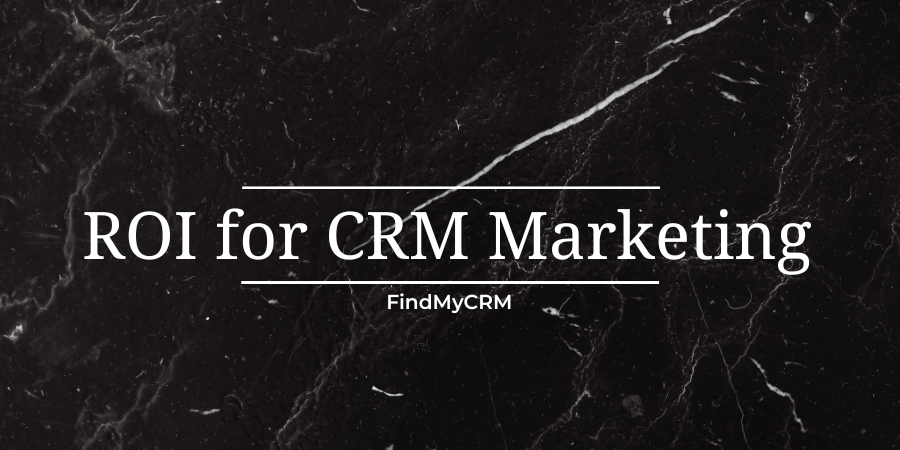Download Now: Free "How to Calculate CRM ROI Metrics" eBook
Why Do You Need a CRM for Your Company?
Small to medium businesses often use spreadsheets, emails, and other disjointed systems to manage customer relationships. However, this is inefficient and frequently results in unpleasant and disorganized client experiences. Any member of your team can use a customer relationship management (CRM) platform to quickly brush up on a particular client relationship because it combines everything from sales through product or service delivery into a single system. You can pay attention to such CRM systems as:
- Freshsales
- Pipedrive
- Zoho
- Act!
- SugarCRM
Here are five key CRM technology capabilities and advantages.

Lead management
When the lead-to-sale process is the main driver of new revenue and progress, it's important to handle each lead with the highest respect. When a potential customer fills out forms on landing pages or speaks with a sales representative, a CRM can record information about them. Businesses can provide more engaging and relevant brand experiences when they keep notes about all of their prospect interactions, including marketing campaign engagement, website browsing activities, sales estimates, and support tickets.
Enhance Customer Support
Everybody has a story to tell about poor customer service. You might be able to prevent negative stories about your company's customer service when your staff uses a CRM to keep track of customer interactions.
CRMs offer phone, email, note, and assignable task logs. This makes it easier for everyone at your company to share records of each customer interaction while managing tasks to avoid issues from slipping through the cracks.
Increase Departmental Collaboration
Collaboration is a key component in improving customer experience. With a cloud CRM, it doesn’t matter if staff is on the same floor, in the same time zone, or even on the same continent. Teams can work together even when they are physically separated because everyone has access to a single, reliable, secure dataset.
Even basic product orders could include input from several persons in different departments. A large number of people may be needed for more complex products and services. A central CRM will simplify information sharing and save time and effort.
Increase Sales
Many of a CRM's immediate advantages focus on cost savings that improve your bottom line. But over time, you ought to see that your CRM also helps your top-line or gross sales. Your sales staff should gather the data necessary to create relevant, excellent sales presentations that are specifically tailored to each client's specific requirements.
The majority of companies rely primarily on sales. You ought to notice a rise in sales productivity once you've installed a strong CRM.
Boost productivity and efficiency
A CRM can increase productivity and efficiency in several ways, including a better experience for your internal users. Customers will appreciate not having to repeat their needs, and your team will benefit from just having to gather that information once.
Numerous repetitive tasks can be automated with a CRM to increase productivity even more. When compared to manual tasks, automated marketing communication, sales pipeline tracking, integrated billing, and customer self-service capabilities can save your staff hours each month.
[Related Article: What Is Marketing Automation?]

Which Industries Ought to Invest in a CRM?
A CRM can be useful in almost any industry with repeat customers or any form of sales. Here are some instances of industries where CRMs are especially common and helpful.
- Retail: Retailers can track customer engagement on various channels, such as social media, phone calls, and emails, using a CRM. CRMs enable you to create and track different customer profiles for higher-end sellers so you can maintain each customer's interest in your brand.
- Finance: CRMs are used by banking, investment, and other financial services to track consumer preferences and needs. For monitoring and managing consumer finances, some platforms offer additional security and customized features.
- Hospitality: CRMs are used by hotels, restaurants, airlines, and travel agencies to track customer preferences and drive automated marketing campaigns.
- Insurance: Both small and large businesses can use CRMs to keep track of customer profiles, maintain customer engagement, and regularly review needs in order to provide relevant products and coverage options.
- Consulting: CRMs play a significant role in the tracking of ongoing sales activities and client service requirements. Advisory and consulting companies can connect client project details to their customer profiles by completely integrating a Professional Services Automation (PSA) tool with CRM.
- Manufacturing: Manufacturers frequently use ERPs to monitor incoming materials and outgoing sales. In order to accurately and quickly deliver every order and meet or exceed customer expectations, CRM modules offer robust communication and customer tracking.
- Wholesale: Wholesalers can use CRMs for both consumers and vendors.
This list is hardly complete. CRMs are used regularly by enterprises in the fields of technology, law, education, mining, transportation, real estate, telecommunication, publishing, health care, utility, infrastructure, printing, and many more.
[Related Aricle: Marketing Automation Tools: Top 7]
CRM ROI: What is it?
ROI CRM is a measure used to evaluate a customer relationship management (CRM) solution's business value. By comparing the amount of revenue your CRM solution makes to the amount it costs, it calculates the return on investment (ROI).
Although ROI is sometimes expressed in dollars, it is always a ratio. CRM ROI is just the ratio of revenue received to the price of CRM implementation. The final result should be a CRM ROI of more than 1 or 100%. This makes sure that businesses don't lose money and that CRM's advantages outweigh its cost.
The basic formula for calculating CRM's ROI is simple and clear:
CRM ROI = (Gains from CRM investment – Cost of CRM investment) / Cost of CRM investment
To simplify and express the ROI in %:
CRM ROI = (Total profit / Total investment) * 100
Nevertheless, this formula does not represent the full picture. Why? This is because evaluating the ROI of a CRM system is not as simple as, for example, analyzing the results of a promotional campaign.
Let’s find out what really impacts the ROI of CRM, ways to improve profitability, and so much more.
What ROI Can Businesses Achieve With a CRM?
It's time to start talking about money right now. You can find some simple CRMs for free, but frequently these lack the security and features that more helpful tools provide. CRMs with all the features you need are effective tools that may increase sales and securely handle your data. You should take into account any setup and training costs in addition to the CRM's pricing, which frequently scales with the size of your company. Experienced business leaders understand that these costs will more than cover themselves when a CRM is used effectively.
According to studies, CRMs can boost sales by 29%, income by 300%, and the productivity of the sales staff by 34%. Depending on the business, the industry, and the rollout stage, the actual results will differ. Successful CRM implementations often produce good returns in terms of annual revenue, client retention, and cost savings/improved productivity. Even very effective sales teams can gain from a CRM's increased productivity, automation, collaboration, and transparency.

10 CRM Functions That Increase ROI
Here are 10 features that increase ROI, but even this is just the tip of the iceberg in terms of what a CRM can do.
- Automated order fulfillment: As soon as a customer order is received, the CRM may start the fulfillment process, involving both your internal staff and outside vendors.
- Customer service: Data is gathered through email, phone, chat, and in-person customer support and is accessible to all users through a single system.
- Cross-selling: Improved cross-selling is made possible by data and customer insights. Your sales team may not be as good at identifying customer needs as your CRM.
- Upselling: The CRM may identify potential upsells at higher service levels in addition to cross-selling features.
- Automatic renewal: Keep track of the dates for customer renewal. When it's time to renew an order or create another one, CRMs can automatically process payments or send out invoices.
- Quote delivery: Within the CRM, you can create and deliver a quote for complicated deals. Both options are available in the system if the consumer wishes to accept or make changes.
- Web-to-lead forms: If you've ever filled an online form for a business only to receive a call from a person immediately, it's possible that the company was using a CRM that included web-to-lead forms. Have your sales staff ready to capture and benefit from hot leads almost immediately as they arrive.
- Customer portal: With a web-based customer portal, your clients can sign in, check their information, update their payment options, download contracts, get in touch with you for support, make purchases, and more.
- Sales forecasting: Tools for sales forecasting make it easier to plan for staffing and keep costs under control.
- Commission pay management: Automated commission systems save managers' and your accounting team's time. Sales staff can log in and get real-time information about their quota and upcoming commission payment. Spending less time on payroll results in cost savings and more time given to customers.
How to measure the benefits of implementing CRM
You need to know how your company was working before you installed the CRM to actually measure gains. Another significant advantage of measuring your ROI for CRM is that it enables you to understand how your teams use CRM tools to enhance business processes. This is known as the "baseline."
Let's look more closely at each metric to see how it may be used to determine your overall ROI.
Cost per lead (CPL)
The Cost Per Lead or CPL metric evaluates the success of your marketing campaigns and teams in generating leads for your sales team.
It includes all costs related to collecting leads, such as salaries, pay-per-click advertising, and any other expenses.
Cost per lead simplified formula:
Cost per lead = Cost of generating leads / total leads acquired
Marketing teams can generate leads more easily using CRM software to automate, collect, and streamline lead-generating processes. In other words, CRM software can generate more leads with less work, which lowers costs.

Revenue per lead (RPL)
The income generated from each lead is frequently calculated by the marketing and sales teams using revenue per lead.
To put it simply, the formula is derived by dividing the total income generated by leads by the amount of SQLs, or sales-qualified leads. It is typically calculated every three months or once a year.
As an example, if your annual income is $400,000 and you have 400 SQLs, then,
Revenue per lead = $400,000 / 400 = $1,000 per lead
Revenue per lead calculation is useful since it shows the efficiency of your marketing and sales teams. Additionally, it gives you an understanding of the lifetime value of your clients.
A CRM program increases efficiency and helps gather and provide information regarding lead behavior. Moreover, it can offer insightful sales information on cross-selling and up-selling.
Overall revenue
One of the most important CRM ROI metrics is overall income. It's, fortunately, the simplest.
If you compare total revenue before and after implementing CRM, you may determine whether your implementation was successful.
Consider Business A, which uses a subscription-based business model. Let's suppose there are no opportunities for upselling and cross-selling.
Total annual revenue = subscriptions sold × annual cost of each subscription
Before CRM implementation, the business sold 5,000 copies. So,
Total annual revenue = 5,000 × $400 = $2,000,000
After CRM implementation, the business sold 7,000 copies. So,
Total annual revenue = 7,000 × $400 = $2,800,000
It’s clear that the income grew by around $800,000 in one year.
However, keep in mind if your CRM is too complicated to use, the initial training cost and learning curve may affect the ROI of CRM. Fortunately, most CRM companies provide full onboarding and training to simplify the transition.
[Related Article: Top 8 Marketing CRM Tools]

How much does it cost to implement a CRM solution?
It may be simpler to measure costs than gains (in most cases). You should simply calculate how much the CRM software will actually cost, including any up-front expenses, monthly subscriptions, training costs, and other expenses. Consider the loss experienced during the CRM deployment stage as well.
Example of CRM Implementation Costs (includes onboarding)
Here is a straightforward example of how to calculate the implementation costs for Business A:
| CRM implementation stage |
Cost |
| Research and planning cost |
$1,900 |
| Implementation |
$2,950 |
| User training and onboarding |
$1,600 |
| Post-live support |
$1,200 |
| Total cost of CRM implementation |
$7,650 |
This is only an illustrative quote to give you an idea of what the prices might be. Please keep in mind that various businesses may have varied CRM implementation costs.
Example CRM usage cost for one year
You've calculated the implementation expenses correctly. The next step is to determine the total CRM cost over a year. Here's an example:
| Particular |
Cost |
| CRM implementation costs (previously calculated) |
$7,650 |
| Annual subscription costs |
$3,500 |
| Premium support costs (if any) |
$700 |
| Total annual costs |
$11,850 |
Finally, it’s all about the cost - your CRM software should improve your financial situation. If not, it is really not very useful.
Your staff should be able to provide your clients with excellent service with a CRM program. As a result, your revenue ought to rise and your acquisition costs ought to reduce.
Conclusion
We have seen the effectiveness of implementing a CRM solution and also have learned how to measure ROI for CRM marketing.
CRM software is a powerful component that can bring in money for your company. However, it is not magic. In the end, your sales staff needs to close deals and provide value to customers and your marketing team should take care of generating leads. You can increase the ROI of your CRM solution in this way.
Choose the CRM for your needs


